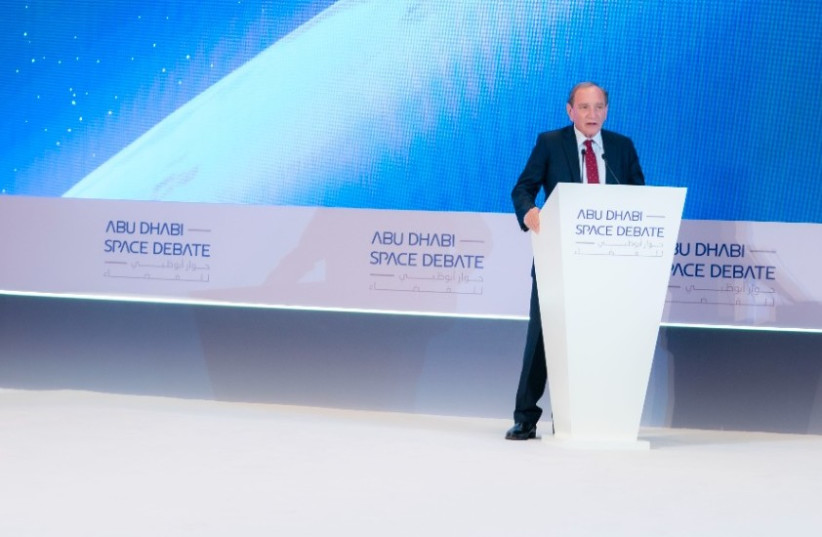The United Arab Emirates launched the Arab world’s first mission to the moon, sending a lunar rover to begin to fulfill the country’s ambition to explore space.
For more stories from The Media Line go to themedialine.org
The Rashid Rover was designed and developed by Emirati engineers from the Mohammed Bin Rashid Space Center in the UAE. It lifted off on Sunday from Cape Canaveral, Florida atop the iSpace M1 lander, which was blasted into the heavens by a SpaceX Falcon 9 rocket.
According to mission organizers, the exploratory mission will attempt to achieve nine major milestones: Launch and Early Orbit, Cruise Phase, Landing, Deployment, Commissioning and Drive Off, Nominal Surface Operations, Hibernation, and Decommissioning.
“Once the lander safely reaches the surface of the unexplored area of the Atlas Crater, the rover will spend one lunar day – some 10 to 12 Earth days – exploring the properties of lunar soil, the petrography or classification of lunar rocks and geology, dust movement, surface plasma conditions, and the Moon’s photoelectron sheath,” according to a statement issued by the organizers.
“Reaching the moon means reaching an exceptional station in the ambitious journey of the country and the people whose aspirations have no limits,” tweeted Sheikh Mohammed Bin Rashid, the vice president, prime minister and minister of defense of the United Arab Emirates, as well as the ruler of Dubai. The UAE has said on multiple occasions that space exploration is a way to boost the economy and help diversification.

The UAE’s Hope spacecraft was launched on July 19, 2020 aboard a Japanese rocket and arrived successfully in orbit around Mars on February 9, 2021, making the Emirates the first Arab country to orbit Mars. Among the UAE’s some 50 space projects launched last year, the country sent a mission to explore the planet Venus and seven other asteroids in the solar system, with an eye toward becoming the first Arab mission to land on an asteroid at the end of the 3.6 billion km journey.
“The Rashid Rover is part of the UAE’s ambitious space program that began with Mars and is now passing through the moon and on to Venus. Our goal is to pass on knowledge, developing our capabilities and adding a scientific footprint in human history,” Sheikh Mohammed tweeted.
“The moon is part of planet Earth in terms of origin, and it is no secret that the moon is part of our existence, which prompts us to discover it, to know what it really looks like,” said Dr. George Friedman, founder and chairman of Geopolitical Futures at the US Naval Institute, in a speech in Abu Dhabi last week during the Abu Dhabi Space Debate.
Friedman said that the moon is a significant component in commercializing space, which is a big opportunity.
"Some have walked hundreds of feet on the moon's surface, but they came back quickly and now we are trying to understand what the moon is," Friedman said.
Investing in space in increasing amounts
The UAE has taken the lead within the Arab world to invest in space. It has established its position among the most important active countries in space exploration through cooperation, in what UAE officials describe as “the peaceful use of outer space.”
“The UAE now owns 19 orbital satellites, has 10 new spacecraft under development, and more than 50 international and emerging space companies, institutions and facilities, plus five research centers and three university programs in space sciences,” said Sarah Bint Yousif Al Amiri, minister for Public Education and Advanced Technology and chairwoman of the UAE Space Agency, in an address at the Abu Dhabi Space debate.
“There are more than 3,000 workers, engineers and experts in the UAE space sector,” she noted, adding: “The UAE has become the fifth country to reach Mars, as the Hope probe entered orbit in February 2021.”
Investment in space has been increasing. According to McKinsey & Company, between 2012 and 2021 the total annual investment leaped to more than $10 billion from $300 million. “Through the first half of 2022, investment lagged behind 2021, but remained quite high by historical standards, indicating that the sector may prove resilient despite the challenges of the current market environment,” the research firm predicted.
Dr. Robin Geiss, director of the United Nations Institute for Disarmament Research (UNIDIR), said in Abu Dhabi that, as investments increase, the UN has a role to play to create a clearer understanding of what is happening.
“The UN is a member state when it comes to treaty-making. In terms of combining knowledge, the UN has so much to offer in terms of how it can bring the industry together,” he said.
